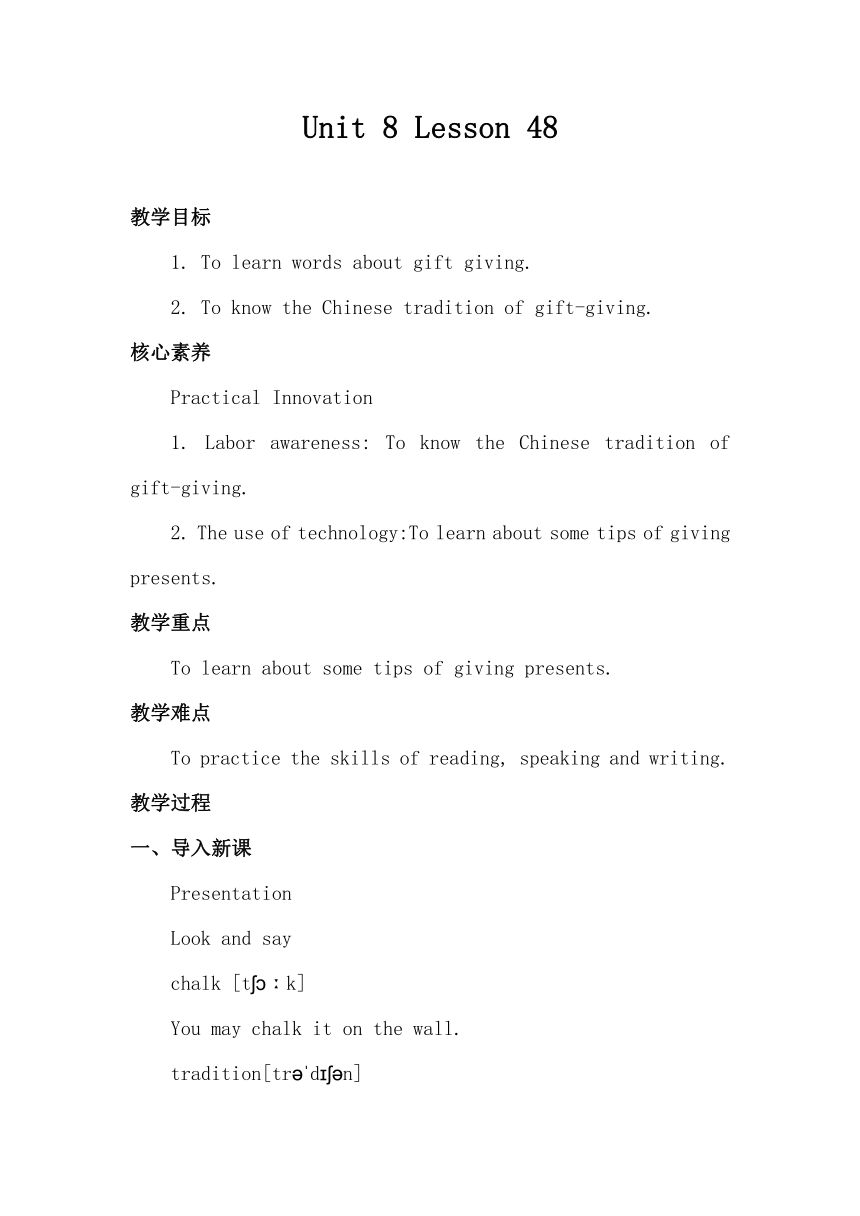
Unit 8 Lesson 48 教学目标 1. To learn words about gift giving. 2. To know the Chinese tradition of gift-giving. 核心素养 Practical Innovation 1. Labor awareness: To know the Chinese tradition of gift-giving. 2. The use of technology:To learn about some tips of giving presents. 教学重点 To learn about some tips of giving presents. 教学难点 To practice the skills of reading, speaking and writing. 教学过程 一、导入新课 Presentation Look and say chalk [t k] You may chalk it on the wall. tradition[tr d n] traditional[tr d n l] His music is an integration of tradition and new technology. reaction [ri k n] His reaction struck me as odd. react [ri kt] You never know how he is going to react. 二、新课讲解 Think About It Your birthday is coming, What gifts would you like to get How do you react when you receive a gift you don’t like 1. Should you praise it 2. Should you accept or refuse it 3. Should you say you don’t like it 1. How do you react when you receive a gift you don’t like Usually, I say thank you politely, I don’t say I don’t like it on the spot. What would happen if you did this to your Australian friends Reading tasks What would happen if you did this to your Australian friends Read the lesson and anwer the questions. My friends will think I really like them and send such gifts again. 三、知识点 Language points 1.My Australian pen pal, Bruce, and his father, came to visit me the day before yesterday. the day before yesterday 前天 【拓展】 yesterday昨天, today今天, tomorrow明天, the day after tomorrow后天 2.At the end of the meal, Mr. Bradshaw opened a box of cookies he had brought from home. at the end of 意为“在……尽头;在……结束时”,既可以指地点,也可以指时间。 【辨析】 at the end of, by the end of (1)at the end of在……尽头/末端,在……结束时,后面可接地点或时间,后接时间时,通常与一般过去时或一般将来时连用。 (2)到……为止,仅指时间,指某一动作在某个时间点以前或到某一时间段为止就已发生或完成,多用于过去完成时;若后面接的是将来时间,句子要用将来完成时。 句子he had brought from home运用了过去完成时,过去完成时由“had+过去分词”构成,其基本用法包括: (1)表示在过去某一时间或某一动作之前已经完成了的动作或状态,动作发生的时间是“过去的过去”。 (2)表示从较远的过去的某一时间开始一直延续到较近的过去的某一时间的动作或状态,往往与for或since连用。 3.We each took a cookie and ate it. each在本句中作We的同位语,此时谓语动词要与We保持一致。 【拓展】 (1)each单独作主语,谓语动词用单数形式。 (2)each of短语作主语,谓语动词用单数或复数形式都可以。 4.The cookie tasted like chalk to me! 本句中的taste用作系动词,意为“尝起来”,后面可接形容词。taste like意为“尝起来像”。 【拓展】 常用的系动词还有: look(看起来), feel(摸起来),smell(闻起),sound(听起来)等。 Cultural differences 送礼物 中国人注重礼品的实用价值;中国人送的是礼品。 西方人往往注重礼品的纪念价值;西方人送的是纪念品。 收礼物 中国,人们接受礼物时往往并不喜形于色,且不当面打开礼品。 西方,人们接受礼物时,首先想到的是感谢,往往当面打开礼物,称赞一番,激动时还拥抱你一下。 Project Research about the tradition of gift-g ... ...
~~ 您好,已阅读到文档的结尾了 ~~